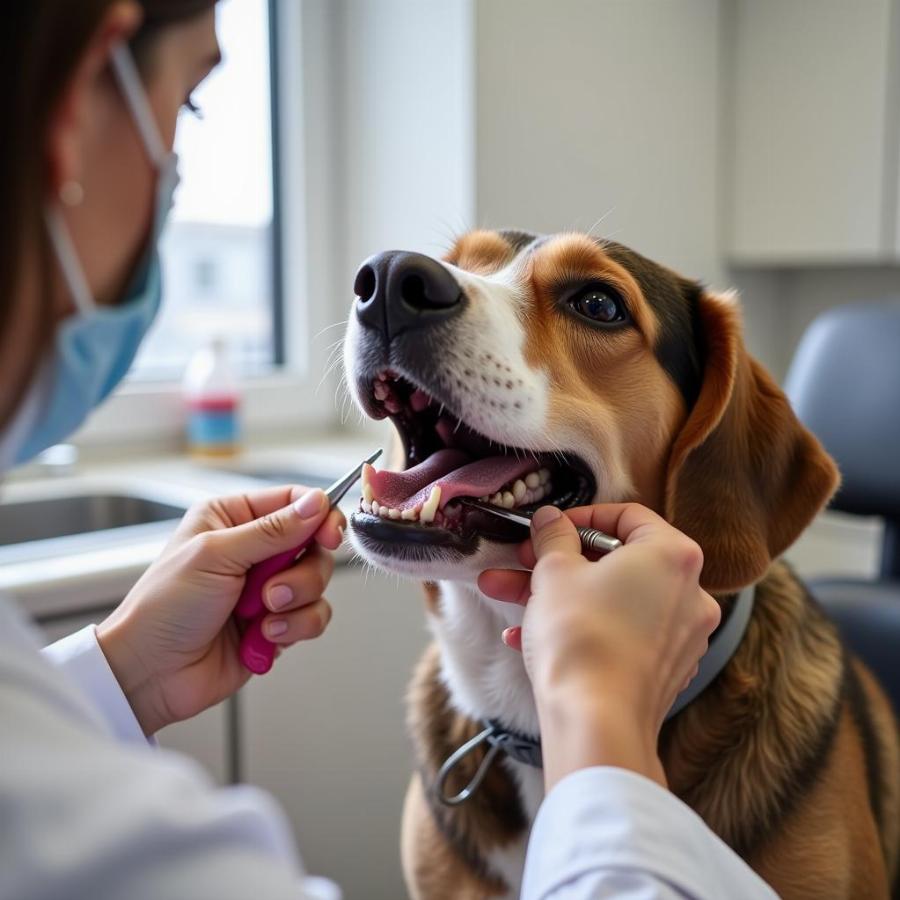Taking care of your furry friend’s health goes beyond walks and treats. Dental hygiene is a crucial aspect of their overall well-being, and that’s where a dog tooth scaler comes in. You might be wondering why a simple toothbrush isn’t enough for your canine companion. The answer lies in the unique structure of their teeth and the specific challenges they face.
Just like humans, dogs can develop plaque, a sticky film that forms on their teeth. If left unattended, plaque hardens into tartar, also known as calculus, which can lead to a host of dental problems. Bad breath is often the first sign, but more serious issues like gingivitis, periodontal disease, and even tooth loss can occur.
Why a Dog Tooth Scaler is Essential
While brushing your dog’s teeth regularly is essential, it often isn’t enough to remove hardened tartar. This is where a dog tooth scaler proves invaluable. These specialized tools are designed to effectively scrape away plaque and tartar buildup without damaging your dog’s enamel.
 Veterinarian using a dog tooth scaler
Veterinarian using a dog tooth scaler
Types of Dog Tooth Scalers
There are two main types of dog tooth scalers:
- Sickle Scalers: These scalers have a curved, pointed tip, resembling a sickle, and are designed to remove large chunks of tartar.
- Curettes: Curettes have a rounded tip and are used to remove smaller pieces of tartar and smooth out the tooth surface after scaling.
It’s important to note that using metal scalers at home without proper training is strongly discouraged. Improper technique can cause pain, injury, and damage to your dog’s teeth and gums.
When to See a Vet
The best approach to your dog’s dental health is a combination of regular home care and professional cleanings.
Schedule an appointment with your veterinarian if you notice any of the following:
- Excessively bad breath
- Red, swollen, or bleeding gums
- Yellow or brown buildup on the teeth
- Difficulty eating or loss of appetite
- Pawing at the mouth
During a professional cleaning, your vet will use a combination of ultrasonic scalers and hand instruments to thoroughly remove plaque and tartar. They may also recommend dental X-rays to assess the overall health of your dog’s teeth and gums.
Maintaining Your Dog’s Oral Health
Prevention is always better than cure. Here are some tips to keep your dog’s teeth healthy:
- Brush your dog’s teeth daily using a dog-specific toothbrush and toothpaste.
- Provide dental chews and toys designed to promote dental health.
- Consider dental-specific treats and food formulated to reduce plaque and tartar buildup.
- Schedule regular dental checkups with your veterinarian.
“Regular dental care can add years to your dog’s life,” says Dr. Emily Carter, a renowned veterinary dentist. “It’s not just about a pretty smile; it’s about preventing serious health issues.”
By understanding the importance of a dog tooth scaler and incorporating regular dental care into your routine, you can ensure your furry friend enjoys a happy, healthy life with a sparkling smile.
FAQs
1. Can I use a human tooth scaler on my dog?
No, never use human dental instruments on your dog. They are not designed for a dog’s teeth and can cause serious damage.
2. How often should my dog have a professional dental cleaning?
Most dogs benefit from a professional cleaning once a year. However, your vet will recommend the best schedule based on your dog’s individual needs.
3. What are some signs of dental pain in dogs?
Dogs may show subtle signs of dental pain, such as decreased appetite, drooling, pawing at the mouth, or reluctance to play.
4. Are there any home remedies for dog tooth scaling?
While some home remedies claim to help with tartar, it’s best to consult your veterinarian before trying any DIY solutions.
5. Can dental chews replace brushing my dog’s teeth?
Dental chews can be a helpful supplement, but they shouldn’t replace daily brushing.
Learn More About Dog Dental Care
For more information on amoxicillin for dogs dosage chart kg and other related topics, explore our comprehensive resources at Beaut Dogs.
Beaut Dogs is your one-stop resource for all things dog-related. From breed information to health tips and product reviews, we’re here to help you provide the best possible care for your beloved companion. For personalized advice and answers to your pet-related questions, reach out to our team at [email protected].